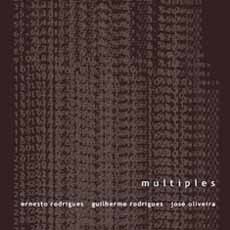
multiples
Ernesto Rodrigues | Guilherme Rodrigues | José Oliveira | cs001
Eulogy of Frankenstein
A multiple is nothing more than one of the possible configurations of the unity when this has been lost for a long time, if it has existed at all. The truth is that we have been talking about the Absolute during all the history of mankind, but very few have said that they saw God, and even Him, according to the Christian faitha, is divided in three, the Father, the Son and the Holy Ghost, demonstrating that what is completed, what is supposedly One, is not self-sufficient. In the same way, the replica is what we have when we cannot own the original, and thence the reason why a recent promotional campaign for the faithfull observance of the authorís copyright is so profoundly stupid. In fact, everything is a replica of anything and anything is a replica of everything - those who affirm the contrary are only throwing dust into our eyes. Michel Ratte says: "The solution of the problem of the relation between the all and the parts in a free musical form must remain as a solution immanent from the music itself", which is a mistake simply because the all IS its own parts and each part a metonymy of the all, a restricted representation of something which, in effect, is not there: it is only suggested, approximated, set to be guessed.
Webern placed the question with his miniatures and the actual electroacoustics reinforced it with his experiences of assemblage or, in the inverse, of dismembering the sound components, reason why a title like «Frankenstein Symphony», given by Francis Dhomont to one of his works, is so proper. Curiously, even technology seems to agree that the part has the all in itself: try to record in your home CD recorder a Bernhard Günter or Francisco López disc containing long silences in each track or composition. The recorder considers terminated the track in which the silence occurs for more than a certain number of seconds and proceeds to new indexation, showing a new track number when the sound starts again. In improvised music, the theme of the all and the parts was introduced by practices that have tried to take this language to other types of situation, like the surrealist "cadavre exquis", the collage of solo improvisations involving a large quantity of musicians and recorded without knowledge of what each of them has done or is going to do, or processes of sampling and studio editing with which the spontaneity is "composed", agglutinating and systematizing what before was not yet defined. However, the Webernian way is still the simplest and more effective of the ways, with pieces of very short duration which valorize only one or two ideas and, in their inteirity, emerge as a fragmentary and non-linear structure, made with particularisms and partial aspects.
This is the case with «Multiples» and that may be one of the reasons why the work developed by the trio formed by Ernesto Rodrigues, Guilherme Rodrigues and José Oliveira is presented as "false chamber music". In it predominates an instrumentation of erudite heritage (violin, viola and cello), but it is not only the intrusion of percussion, soprano saxophone and guitar that interferes with this historic burden. The concept of symmetrical perfection and consistence, of "ligament", which presided to the so-called "classical music", is definitively removed. The brief sound eruptions of this CD go from pointillism, pianissimo and minimal to what Ernesto Rodrigues calls "dimmed heritage" of serialism, associated to an understanding of improvisation with roots on free jazz. In between, adjacent textures of spectral music are also developed - "or are in any way associable" - cautions the violinist. This juxtaposition of parameters contributes moreover to the multiplication of solutions (the existence of several structural "frames" implies their integration/application by diverse means), and so much the better if in them we find links, relations, coincidences, because it is through these points of convergency that globality, the Form, peeps.
Rui Eduardo Paes - (journalist and music writer)